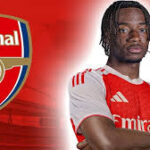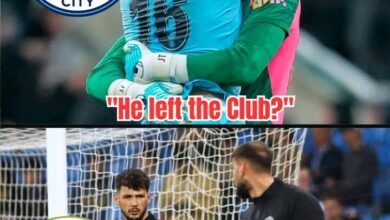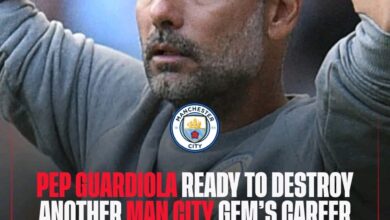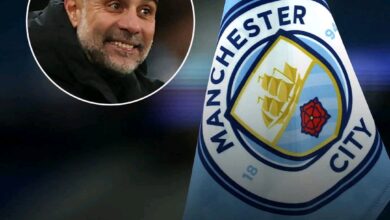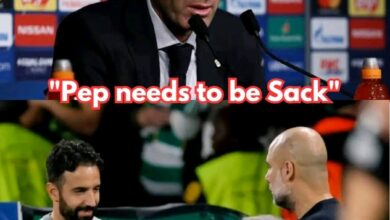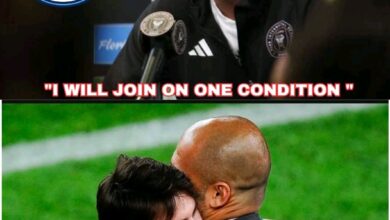Chelsea’s £52m Gamble: The Noni Madueke Transfer Saga

In a move that has sent shockwaves through the footballing world, Chelsea Football Club has officially confirmed the departure of English winger Noni Madueke to North London rivals Arsenal for a substantial fee of £52 million. The transfer, structured as £48 million upfront with an additional £4 million in performance-related bonuses, represents one of the most controversial dealings between these two Premier League giants in recent memory.
The announcement came as a surprise to many Chelsea supporters who had grown accustomed to seeing Madueke feature prominently in Enzo Maresca’s tactical setup throughout the previous season. The 22-year-old winger had established himself as a regular starter on the right flank, demonstrating flashes of brilliance that reminded observers why Chelsea paid PSV Eindhoven a significant sum to secure his services initially
Noni Madueke’s journey at Stamford Bridge has been nothing short of a rollercoaster ride. Arriving from PSV Eindhoven with considerable fanfare and expectation, the young Englishman was viewed as a potential solution to Chelsea’s long-standing issues on the right wing. His pace, directness, and ability to beat defenders in one-on-one situations made him an attractive proposition for a Chelsea side looking to inject more dynamism into their attacking play.
During his time at PSV, Madueke had showcased remarkable development, transitioning from a promising academy graduate to a first-team regular in the Eredivisie. His performances in European competition, particularly in the Champions League and Europa League, had caught the attention of several top European clubs. Chelsea, under the stewardship of their new ownership structure, moved decisively to secure his signature, viewing him as a long-term investment in their attacking arsenal.
However, the transition from Dutch football to the Premier League proved more challenging than many anticipated. The intensity, physicality, and tactical sophistication of English football presented obstacles that Madueke struggled to overcome consistently. While his raw talent was evident, questions arose about his decision-making in the final third, his defensive contributions, and his ability to perform consistently at the highest level.
Enzo Maresca’s relationship with Noni Madueke has been characterized by both faith and frustration. The Italian tactician, known for his meticulous approach to player development and tactical discipline, saw potential in the young winger that he was determined to unlock. Throughout the season, Maresca consistently selected Madueke for important fixtures, demonstrating his belief in the player’s ability to contribute meaningfully to the team’s objectives.
However, this faith was tested on multiple occasions. Maresca’s public comments about dropping Madueke due to a lack of intensity highlighted the ongoing concerns about the player’s commitment and application. The first incident occurred during a training session where Maresca felt Madueke’s effort levels were below the standards expected at Chelsea. The second, more public dropping came during a crucial Premier League fixture where the manager deemed Madueke’s approach in the previous game insufficient.
These incidents revealed the complex dynamics at play in modern football management. While Maresca recognized Madueke’s talent and potential impact, he was unwilling to compromise on the work rate and intensity that he demanded from all his players. This tension between talent and application became a recurring theme throughout Madueke’s final season at Chelsea.
Despite these challenges, it’s important to note that Maresca never publicly criticized Madueke’s character or ability. His comments were always framed constructively, emphasizing the need for improvement rather than wholesale condemnation. This approach suggested that the manager retained hope for Madueke’s development, making the eventual transfer all the more surprising to outside observers.
The decision to sell Madueke appears closely linked to Chelsea’s evolving tactical approach under Maresca’s guidance. The Italian coach has been implementing a system that places greater emphasis on central attacking players and versatile forwards who can operate across multiple positions. This tactical shift has created opportunities for players like Cole Palmer to move into wider positions while maintaining their creative influence on the game.
Palmer’s deployment on the right wing represents a significant change in Chelsea’s attacking structure. The young midfielder’s technical ability, vision, and goal-scoring threat from wide positions offer different qualities compared to Madueke’s more traditional wing play. Palmer’s capacity to drift inward, create overloads in central areas, and link up with teammates aligns more closely with Maresca’s tactical philosophy.
Furthermore, Chelsea’s investment in new strikers and central attacking players has created a ripple effect throughout their formation. The need to accommodate these new signings has naturally reduced the available opportunities for specialist wingers like Madueke. This evolution reflects broader trends in modern football, where tactical flexibility and positional interchange are increasingly valued over traditional position-specific specialists.
The emergence of Jamie Gittens as a potential first-team option has also influenced this decision. The young winger’s development through Chelsea’s academy system represents the kind of organic talent progression that the club hopes to emphasize. Gittens’ familiarity with the club’s culture and tactical approaches provides advantages that external signings like Madueke might struggle to match.
The decision to sell Madueke to Arsenal adds a layer of controversy that cannot be ignored. Transfers between Chelsea and Arsenal have become increasingly common in recent years, but they remain sensitive affairs for supporters of both clubs. The rivalry between these London neighbors runs deep, and the movement of players between them inevitably generates intense scrutiny and debate.
From Arsenal’s perspective, Madueke represents an interesting proposition. Mikel Arteta’s tactical system has shown flexibility in accommodating different types of wingers, and Madueke’s pace and directness could provide Arsenal with a different dimension in their attacking play. The Spanish coach’s track record of improving individual players suggests that he may see potential in Madueke that others have been unable to fully unlock.
The financial aspects of the deal also warrant consideration. At £52 million, Arsenal is making a significant investment in a player whose Chelsea career has been marked by inconsistency. This price tag suggests that Arsenal’s recruitment team sees substantial untapped potential in Madueke, perhaps believing that a change of environment and tactical system could catalyze his development.
For Chelsea, the decision to sell to a direct rival reflects the pragmatic approach that has characterized their recent transfer dealings. The substantial fee represents good value for a player who had fallen down the pecking order and whose contract situation may have influenced the timing of the sale. Rather than risk losing him for a reduced fee in the future, Chelsea has opted to maximize their return on investment.
One of the most intriguing aspects of the Madueke situation has been the polarized opinions about his character and personality. While some observers found his demeanor and approach frustrating, others argued that such judgments were unfair and potentially based on limited interactions or misconceptions.
The nature of wing play inherently involves risk-taking and attempting difficult skills that may not always succeed. Madueke’s playing style, characterized by direct running and ambitious dribbling, naturally led to situations where his decision-making was scrutinized. The frustration expressed by some fans may have been more about the outcomes of his attempts rather than the attempts themselves.
It’s crucial to recognize that professional footballers operate under immense pressure, and their public personas may not accurately reflect their true characters. Madueke’s apparent confidence on the pitch could be interpreted as either arrogance or self-belief, depending on one’s perspective. Similarly, his interactions with teammates and staff, which are largely hidden from public view, may paint a very different picture of his personality. The challenge for any young player at a club like Chelsea is navigating the expectations and pressures while continuing to develop their game. Madueke’s experience highlights the difficulty of this process, particularly when operating under intense media scrutiny and fan expectation.
From a purely technical standpoint, Noni Madueke possesses several attributes that make him an attractive proposition for top-level football. His pace is undoubtedly his most obvious asset, allowing him to stretch defensive lines and create space for teammates. This speed, combined with his ability to carry the ball at pace, makes him a constant threat in transition situations.
Madueke’s dribbling ability, while sometimes inconsistent, showed moments of genuine quality during his Chelsea tenure. His capacity to beat defenders in one-on-one situations created numerous opportunities, even if the final product didn’t always match the initial promise. This skill set is particularly valuable in modern football, where the ability to create individual moments of brilliance can be the difference between victory and defeat. However, Madueke’s weaknesses were equally apparent throughout his Chelsea career. His decision-making in the final third often left much to be desired, with promising attacking moves frequently breaking down due to poor pass selection or shot choice. This inconsistency in execution became a source of frustration for teammates, coaches, and supporters alike.
Defensively, Madueke’s contributions were often questioned. Modern wingers are expected to contribute significantly to their team’s defensive structure, and Madueke’s commitment to tracking back and supporting his full-back was sometimes found wanting. This aspect of his game became particularly problematic in matches where Chelsea needed to maintain defensive solidity. His crossing ability, while showing occasional flashes of quality, lacked the consistency required at the highest level. For a player operating primarily from wide positions, the ability to deliver quality service into the penalty area is fundamental, and Madueke’s inconsistency in this area limited his overall effectiveness
The decision to sell Madueke becomes more understandable when considering the emergence of Jamie Gittens as a viable first-team option. Gittens represents everything that modern football clubs hope to achieve through their academy systems – homegrown talent with the technical ability and tactical understanding to compete at the highest level.
Gittens’ development through Chelsea’s youth system has provided him with a deep understanding of the club’s culture, expectations, and tactical approaches. This familiarity offers advantages that external signings like Madueke often struggle to match, particularly in terms of adaptation time and cultural integration.
From a tactical perspective, Gittens appears to align more closely with Maresca’s preferred style of play. His ability to maintain possession under pressure, make intelligent runs into space, and contribute to the team’s overall tactical structure makes him an attractive option for a coach who values system players over individual brilliance.
The financial implications of promoting Gittens over retaining Madueke are also significant. Academy graduates represent pure profit in terms of Financial Fair Play calculations, while external signings like Madueke require ongoing amortization of their transfer fees. This economic reality influences many modern transfer decisions, even when the football case might be more nuanced
The imminent arrival of Estevao Willian from Palmeiras adds another dimension to Chelsea’s decision-making process. The young Brazilian winger has been identified as one of the most promising talents in world football, with his performances in South American competitions suggesting he possesses the potential to become a world-class player.
Estevao’s signing represents a significant investment in Chelsea’s future attacking options. His technical ability, creativity, and goal-scoring threat from wide positions offer qualities that could transform Chelsea’s attacking play. The decision to sell Madueke may be influenced by the club’s confidence in Estevao’s ability to make an immediate impact.
However, the transition from South American to European football is never guaranteed to be smooth. Many talented players have struggled to adapt to the different tactical demands, physicality, and pace of European competitions. Chelsea’s willingness to sell Madueke suggests they believe Estevao’s adaptation will be successful, but this represents a calculated risk.
The competition for places that Estevao’s arrival will create could have been beneficial for Madueke’s development. The presence of a highly-rated peer might have motivated both players to raise their performance levels. Instead, Chelsea has opted for a different approach, prioritizing the new signing over the existing squad member
The £52 million fee for Madueke represents significant income for Chelsea’s ongoing squad development plans. This revenue can be reinvested in other areas of the squad where Maresca identifies needs, whether in defense, midfield, or alternative attacking options.
From a Financial Fair Play perspective, the sale helps Chelsea balance their books while they continue to invest in new signings. The club’s recent spending spree has required careful management of their financial position, and sales like this provide the flexibility needed to continue operating in the transfer market.
The timing of the sale is also strategically important. With Madueke entering the final years of his contract, his transfer value would naturally decline over time. By selling now, Chelsea maximizes their return on investment while the player still commands a premium price. However, there are risks associated with this approach. If Madueke develops into a consistently high-performing player at Arsenal, Chelsea may face criticism for selling too early. The potential for player development, particularly for someone still only 22 years old, means that this transfer could be viewed differently in hindsight.
The Madueke sale reflects broader changes in Chelsea’s transfer philosophy under their new ownership structure. The focus has shifted toward younger players with high potential, tactical flexibility, and strong resale value. This approach prioritizes long-term sustainability over short-term squad building.
This philosophy has created a more ruthless environment where players must quickly prove their worth or face the prospect of being sold. While this approach can create a competitive atmosphere that drives performance, it can also undermine player confidence and development. The speed at which decisions are made under this new structure has surprised many observers. Traditional football wisdom suggests that young players need time to develop and adapt, but Chelsea’s approach appears to prioritize immediate impact and clear trajectory
From Arsenal’s viewpoint, the acquisition of Madueke represents both an opportunity and a challenge. Mikel Arteta’s track record of improving individual players suggests confidence in his ability to unlock Madueke’s potential. The Spanish coach has successfully developed several wingers during his tenure, creating an environment where Madueke might thrive. Arsenal’s tactical system, which often emphasizes wide play and crossing opportunities, might suit Madueke’s skill set better than Chelsea’s more intricate passing patterns. The different demands and expectations at Arsenal could provide the fresh start that Madueke needs to fulfill his potential.
The rivalry aspect adds extra motivation for Madueke to succeed. Proving his worth against his former club could provide the psychological drive needed to elevate his performances. History is full of players who have used such situations as catalysts for career advancement.
However, Arsenal fans will expect immediate returns on their significant investment. The pressure to perform at a new club, particularly one with championship aspirations, could either inspire Madueke to new heights or prove overwhelming.
The long-term implications of this transfer extend beyond the immediate tactical considerations for both clubs. For Chelsea, the sale represents a test of their new recruitment and development strategies. If their replacements for Madueke prove successful, it validates their approach to squad management.
For Arsenal, the signing represents a statement of intent in their pursuit of Premier League and European success. The willingness to invest significantly in a player from a rival club demonstrates their ambition and confidence in their development capabilities.
The transfer also highlights the changing dynamics of player movement between traditional rivals. Economic considerations and sporting pragmatism increasingly override historical rivalries when clubs make transfer decisions.
The Noni Madueke transfer saga encapsulates many of the complexities and contradictions of modern football. It highlights the tension between talent and consistency, the pressure on young players to perform immediately, and the increasingly pragmatic approach to squad building adopted by top clubs.
Whether this proves to be a shrewd piece of business by Chelsea or a missed opportunity remains to be seen. The ultimate judgment will depend on how both Madueke and Chelsea’s alternative attacking options perform in the coming seasons. What is certain is that this transfer represents a significant moment in the careers of all involved and will be scrutinized closely by football observers.
The story of Noni Madueke at Chelsea serves as a reminder that potential alone is not enough at the highest level of football. Consistency, application, and tactical understanding are equally important, and the failure to develop these aspects can lead to even talented players finding themselves surplus to requirements.
As Madueke begins his new chapter at Arsenal, both he and Chelsea will be hoping that this transfer proves beneficial for all parties involved. Only time will tell whether this represents a necessary evolution in Chelsea’s squad development or a premature end to what could have been a successful partnership.





